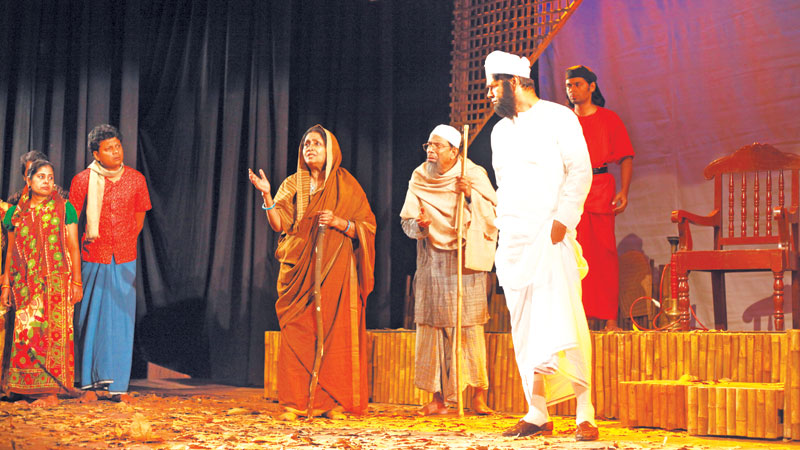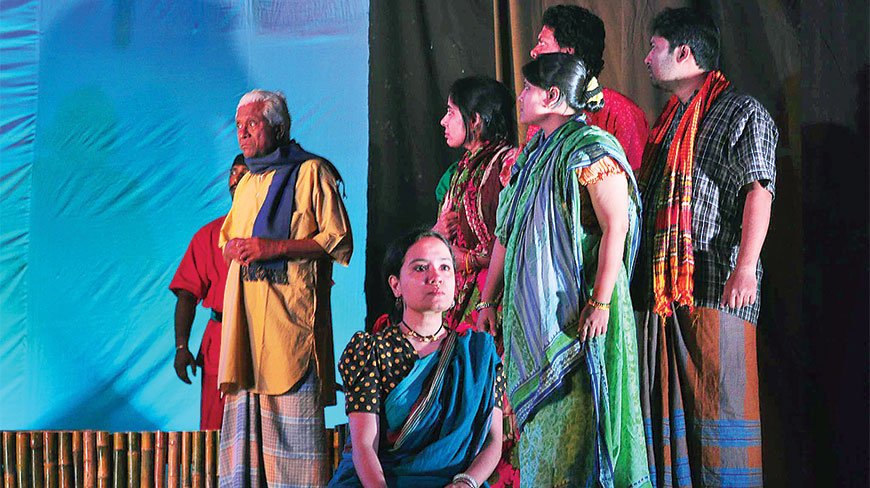When one considers the historical background of the Bangladesh Liberation War, also known as the armed upheaval spearheaded by Bengali nationalists in 1971 in an attempt to secure freedom and autonomy for Bangladesh (then East Pakistan), Syed Shamsul Haque’s evocatively written play Payer Awaj Pawa Jai (At The Sound of Marching Feet) immediately comes to mind.
The movement included a diverse range of East Pakistanis, such as militia and citizens, who rose with arms and filled the streets in opposition to West Pakistan’s oppressive regime over the linguistically and regionally distinct East Pakistan, two different territories of the same nation, Pakistan.
The movement for Bengali rights began immediately after Pakistan’s inception as a country, divided into two sections called West Pakistan and East Pakistan, which we know today as Pakistan and Bangladesh respectively. The unwillingness to acknowledge Bengali as an official language of Pakistan and the erasure of it from academic use in the early years after the partition of India and Pakistan, financial inequity between the two territories, the despotism of the West Pakistani political elite over Pakistan, military laws, a distasteful attitude towards Bengali culture, and the ultimate suppression of the Bengali-speaking Muslim community made a significant contribution to fear and anger, giving rise to the armed fight for liberation.
The play Payer Awaj Pawa Jai written by Syed Shamsul Haque is a verse play that explores the terrible slaughter and mass rapes perpetrated by the militant forces against the Bengali speaking Muslim community amidst Bangladesh’s liberation struggle.

The setting for the narrative is a village in East Pakistan. The performance opens in the courtyard of a district’s headman, with people forming the chorus, many of whom do not talk but rather use movement to capture the spirit of the event. The villagers claim that Bangladeshi “partisans” are approaching from the East, and the village women and children gathered there have come to seek the sanctuary of the headman. As they hear the footsteps of freedom fighters approaching in the distance, the villagers turn to the village’s headman.
The drama also unabashedly depicts a woman’s role in challenging power and the traumatic aspects of engaging in resistance as a woman. The character of the headman’s daughter brings to light an essential feature in which the legitimacy of organised religion and priests is called into doubt. When the Priest tells her that she cannot question God or religion, she boldly asks how it is fair that people in positions of authority may do all manner of sins in the name of God
The headman and his colleague, a priest, attempt to deceive the villagers into believing that Pakistani military personnel are their guardians and that the rebels are on the edge of defeat. The headman’s daughter then reveals that her father dishonoured her by handing her over to a military commander through false marriage. The military officer abuses his power and superior authority to coerce the headman, leading to a fake marriage. The officer then uses brute force on her on the wedding night and then flees the scene the next day, taking advantage of their anxiety.
Throughout the play, the role of institutionalised religion in the oppression of the marginalised Bengali community is highlighted through several characters. While the headman and the priest represent the village’s elite powerful strata and the metaphorical “umbrella” they believe protects them due to their loyalty to the military and the oppressive, tyrannical, and hyper-nationalist state, the headman soon realises that he’s not exactly safe despite his blind loyalty.
When the military commander threatens to rape his daughter if he doesn’t willingly give her away, his illusion of being protected shatters. It is implied that his desire to maintain his power and status has led him to betray his own people in the village and cost him his “honour“.

As corrupt leaders frequently do, we see the headman employ several diversionary methods, and l
